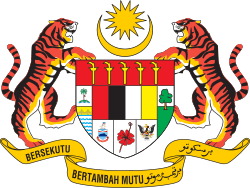Rukunegara
The Rukunegara or sometimes Rukun Negara (Malay for "National Principles") is the Malaysian declaration of national philosophy instituted by royal proclamation on Merdeka Day, 1970, in reaction to a serious race riot known as the 13 May Incident which occurred in 1969. The incident proved at that time that Malaysian racial balance and stability was fragile. Immediately thereafter, the Malaysian government sought ways to foster unity among the various races in Malaysia. One of the methods used to encourage unity is the Rukunegara.
The word Rukunegara can refer to the whole declaration, the words after the preamble (beginning Maka kami...) or the five principles alone.
The formulation of the principles of the Rukun Negara was the efforts of the National Consultative Council (Majlis Perundingan Negara or MAPEN), headed by Tun Abdul Razak. The aim of the Rukun Negara is to create harmony and unity among the various races in Malaysia (Jeong & Nor Fadzlina, 2012; 2007). Thereafter, the New Economic Policy (1971-1990) was launched in 1971, the aim was to create unity among the various races in Malaysia, through economic equality, via the reduction of the economic gap among the Malays and Bumiputera, with that of the Chinese in Malaysia.
Malay text
BAHAWASANYA NEGARA KITA MALAYSIA mendukung cita-cita hendak:
- mencapai perpaduan yang lebih erat di kalangan seluruh masyarakatnya;
- memelihara satu cara hidup demokratik;
- mencipta satu masyarakat adil di mana kemakmuran Negara akan dapat dinikmati bersama secara adil dan saksama;
- menjamin satu cara liberal terhadap tradisi-tradisi kebudayaannya yang kaya dan berbagai corak; dan
- membina satu masyarakat progresif yang akan menggunakan sains dan teknologi moden.
MAKA KAMI, rakyat Malaysia, berikrar akan menumpukan seluruh tenaga dan usaha kami untuk mencapai cita-cita tersebut berdasarkan atas prinsip-prinsip yang berikut :
- KEPERCAYAAN KEPADA TUHAN;
- KESETIAAN KEPADA RAJA DAN NEGARA;
- KELUHURAN PERLEMBAGAAN;
- KEDAULATAN UNDANG-UNDANG;
- KESOPANAN DAN KESUSILAAN
English version
WE, HER PEOPLES, pledge our united efforts to attain these ends guided by these principles:
- BELIEF IN GOD
- LOYALTY TO KING AND COUNTRY
- UPHOLDING THE CONSTITUTION
- RULE OF LAW
- GOOD BEHAVIOUR AND MORALITY
Tamil version
தேசிய கோட்பாடுகள் :
1) இறைவன் மீது நம்பிக்கை வைத்தல்
2) பேரரசருக்கும் நாட்டிற்கும் விசுவாசம் செலுத்துதல்
3) அரசியலமைப்புச் சட்டத்தை உறுதியாகக் கடைபிடித்தல்
4) சட்டம் முறைப்படி ஆட்சி நடத்துதல்
5) நன்னடத்தையும் ஒழுக்கத்தையும் பேணுதல்
Chinese version
我们的国家马来西亚决心致力:
- 在全民中达致更巩固的团结
- 维护民主的生活方式
- 创立一个国家财富获得公平享受的公平社会
- 宽宏对待国内丰富与多姿多彩的文化传统
- 建立一个科学与工艺进步的社会
因此,我们——马来西亚的人民,誓言同心协力遵照以下原则来达致上述目标:
- 信奉上苍、
- 忠於君国,
- 维护宪法、
- 尊崇法治、
- 培养德行.
Recitation
It is a norm for primary and secondary public schools in Malaysia to recite the pledge weekly during a compulsory assembly. Pledge reading follows immediately after the singing of the Malaysian national anthem, Negaraku. Of some interest, the Rukun Negara could usually be found behind the cover of every exercise book that is typically used by primary and secondary Malaysian public school students. This is primarily a move recognised to have been formulated to emulate the similar tactic introduced by the Singapore government immediately after her expulsion from the Malaysian Federation in 1965.
On 8 December 2005, the Malaysian government has made reading of the pledge compulsory at official functions. The announcement was made a few months after the government made singing of the national anthem as compulsory at every official function. (Bernama)
See also
References
- Jeong Chun Hai @Ibrahim & Nor Fadzlina Nawi. (2012). Principles of Public Administration: Malaysian Perspectives. Kuala Lumpur: Pearson. ISBN 978-967-349-233-6
- Jeong Chun Hai @Ibrahim. (2007). Fundamental of Development Administration. Selangor: Scholar Press. ISBN 978-967-5-04508-0
